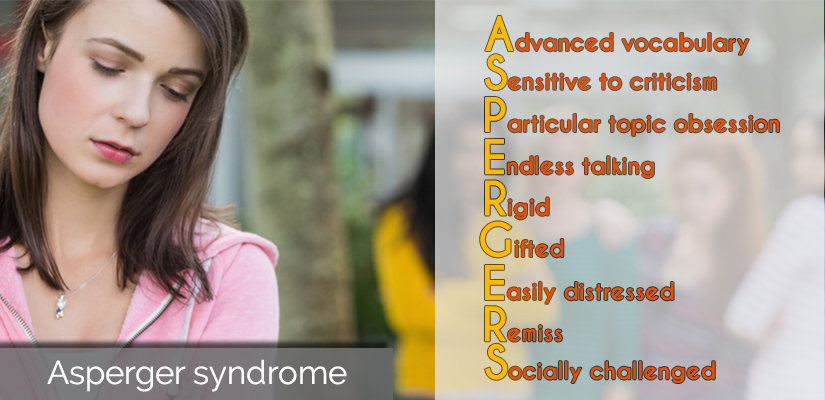
According to National Institute of Neurological Disorders and Stroke (NINDS), part of the National Institute of Health defines Asperger (Asperger’s) Syndrome is a developmental disorder. They get a different type of difficulties in social interaction and nonverbal communication and they communicate with restricted and repetitive patterns of behavior and interests. Asperger’s Syndrome is a mild form of Autism.
If you need any assistance or have a question about Asperger syndrome or Autism, you can consult our HearingSol experts with your problem, feel free to call us on +91-9327901950. We are always here to help you.
It was first discovered in the 1940s by Hans Asperger. He absorbed some children have difficulty in integrating with society or their way of speaking is repetitive and disjointed. It is a type of autism spectrum disorder (ASD) that affect person communication and socialization skills. The signs of Asperger’s syndrome are found from the first year of life and it founded in both males and females. Teaching them can enhance the quality of their life.
NINDS characterize Asperger Syndrome on the basis of these neurological conditions:
- The greater or lesser degree of impairment in language and communication skills: They produce socially and emotionally inappropriate behavior and the inability to interact.
- Repetitive or restrictive patterns of thought and behavior: It is peculiarities in speech and language such as speaking in an overly formal manner or in a monotone or getting figures of speech literally.
- Classic autism – Communication and social challenges and unusual behaviors is the symbol of classic autism.
- Rett syndrome – It is a rare neurological disease that affects mostly girls.
- Childhood disintegrative disorder – It is a rare condition characterized by the late onset of developmental delays—or severe and sudden reversals—in language, social function, and motor skills.
- A pervasive developmental disorder – It is a group of disorders that symbolizes delays in the development of socialization and communication skills.
Asperger Syndrome Symptom
- Child’s take interest in a single object and neglect other topics.
- They want to know everything about their topic of interest and conversations with others.
- They use formal vocabulary and formal speech patterns like a professor.
- Socially and emotionally inappropriate behavior and the inability to interact successfully with peers.
- Repetitive routines and rituals especially in speech and language.
- Problem With non-verbal behavior (Such as eye contact, hand gesture, and facial expression). The movements become clumsy and uncoordinated.
- Underdevelopment of social skills means they are unable to make friends and interact with people, easily.
- A person with Asperger’s Syndrome has a lack of bodily coordination. They are walking with stilted gait, making jerk motion, and tendency to be awkward and clumsy are observed in many Patients.
- They may bother due to loud noise, lights, and strong taste or texture.
- There will be repeat rituals and routines. To change the routine is hard for them.
- People with Asperger’s Syndrome find it difficult to be empathetic or understand the feeling of others.
- A person with Asperger’s Syndrome can have a peculiar manner of speaking.
- They have limited and obsessive range of interest.
- A scripted, formal, and robotic type of speaking and also delay in motor skill.
Causes Of Asperger Syndrome
There isn’t an exact cause of Asperger syndrome.factors that cause Asperger syndrome is genetic and environmental and it leads to changes in the brain that develops into Asperger syndrome.
Genetic: The presence of Asperger syndrome is associated with a genetic disorder. Genetic changes affect their brain and brain cells which is responsible for Asperger syndrome.
Environmental: Some researchers show environmental conditions are also responsible such as viral infections, prenatal complications, and air pollutants.
Asperger Syndrome Treatment
Asperger syndrome affected people who have poor communication skills, obsessive or repetitive routines, and physical clumsiness. There are no treatments are available to treat it permanently but some professionals believe we can improve their lifestyle by providing him a supportive and loving environment. We need to remember Asperger Syndrome affected child or person just like every other child and person they have their own strength and weaknesses and needs so we need to give him support and understandings.
Steps of treatments:
- Education and training – It is the main step of the treatment of Asperger’s syndrome.
- Social Skills Training and Speech-Language Therapy – A Speech Therapist them to understand what other people mean when they speak. And the children or adults practice how to extract the meaning of other people’s speech.
- Cognitive Behavior Therapy – Talk Therapy that helps them to better manage their emotional responses as well as their urge to perform rituals and routine. They may also practice exercises to use while dealing with a challenging solution, such as deep breathing, relaxation, and internal dialogue.
- Applied Behavioral Analysis (ABA) – It is the therapy based on the science and behavior. As it involves radical behaviorism and the experimental analysis of behavior.
- Sensory Integration/Occupational Therapy – The therapy deal with the sensory issue as well as a poor motor skill.
- Medication – It may not be necessary if Asperger’s syndrome is the only issue but if there are co-occurring disorders, it may be a beneficial part of treatment. As a result medication and drugs are totally advisable for the treatment.
- Group Program – Group Program can be helpful for working on social skills. They also serve as a support system to an individual with Asperger’s Syndrome and their families. In group therapy, he/she can learn how to function more comfortably in social situations.
If you need any assistance or have a question about Asperger syndrome or Autism, you can consult our HearingSol experts with your problem, feel free to call us on +91-9327901950. We are always here to help you.
